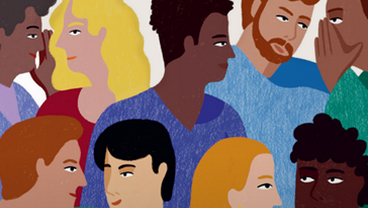The Beauty of Difference

"Wer wir sind" ("Who We Are"), is the title of Lena Gorelik’s book, an autobiographical novel that shows how identity is forged in the conflict between shame and pride, assimilation and foreignness. It is about a girl who moves to Germany with her family in 1992 and becomes a foreigner. A Jewish refugee child in a homemade parka, who pronounces words so ‘strangely’ that other children laugh at her. Who grows up in Germany during the ‘baseball bat years’ of the 1990s, which have featured in many texts since the racially motivated and antisemitic attacks in Halle and Hanau in 2019 and 2020.
What am I, and what am I not?
Our society needs ideas about how to turn its differences into strength in order to counter prejudice and hostility. This is one reason why, in my book "Die Schönheit der Differenz" ("The Beauty of Difference"), I invite the reader to reflect on the state of our society. On the ideas we have about each other. Constructions. The perception of supposed groups, appearance, background, desire, body and religion.
How can the complexity of our existence and co-existence be better understood from a Black, disabled, queer, spiritual or psychological and neurological point of view? What does it mean to be privileged in Germany – in other words ‘white’, heterosexual, mentally well, conventionally attractive, able-bodied, socialised in a Christian environment, with qualifications and a secure income? To build a good community, each of us needs to understand our own position within society, and to know: what am I, and what am I not? And we must confront this fact without defensiveness or (self) stigmatisation.
There are many authors who produce critiques of power in society and write texts exploring their own position in the social hierarchy, be that an oppressed position or privileged one. In their stories they move away from suffering and towards the causes and consequences of injustice, illustrating the links between power and identity in various languages. They point the way towards understanding, and engage with painful memories of the past. They reawaken memories.
The 1990s are also addressed in "Dschinns" ("Djinns"), Fatma Aydemir’s family saga set in a fictitious city on the Rhine and featuring the Yilmaz family, made up of father Hüseyin, his wife and their four children. A migrant worker from a Turkish mountain village, Hüseyin moved to Germany with his wife Emine but has never really felt settled there. In the book, different narrative voices explore the multigenerational impact of migration and Germanness, gender roles and gender identities, racism, homophobia and classism – all of which were much less part of the public debate in the 1990s than they are now.

Who we are (Wer wir sind)
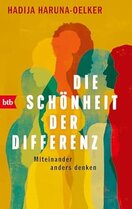
The Beauty of Difference (Die Schönheit der Differenz)
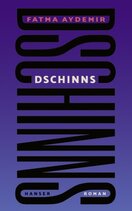
Djinns (Dschinns)
‘We become ourselves only to the extent that the other becomes himself, we become free only to the extent that the other becomes free.’
Karl Jaspers (1883–1969), German psychiatrist and philosopher, in "Weltgeschichte der Philosophie"
People read novels because narrative voices help them to better understand themselves, as well as other people and their lives. The ephemeral, incidental portrayal of experiences and characteristics in texts thus plays an important role: that of representation. It is a natural way of conveying a message without finger-wagging. Different perspectives on the world resonate with readers and take people out of their pigeonholes. How does it feel to arrive in a foreign city? And how does it feel to be a Black person in Germany in search of a place where you can feel happy and safe? This is what Musa Okwonga writes about in "Es ging immer nur um Liebe" ("In the End, It Was All About Love"). ‘Borderless’, as the poet May Ayim once described it in one of her poems.
In order to understand present-day Germany, we need to understand the interwovenness of people’s differing experiences and of the country’s history. We also need to engage critically with the past, since everyone in Germany, in different ways, carries the consequences of the country’s history with and within them. This includes the Holocaust and the process of coming to terms with it, antisemitism, racism, and the role of the ‘forgotten’ victims, including Sinti and Roma people, gay people, people with disabilities, socially disadvantaged people, and political opponents of the Nazis. We need new narrative forms – because the big political question (still) is: where does far-right violence come from? And why has all never been well in Germany?
We are here because you were there
‘We are here because you were there’ is a phrase coined by Ambalavaner Sivanandan, director of the Institute of Race Relations in London, in the 1980s. It refers to the global context of migration flows, reminding us of centuries of colonial exploitation and pointing out that the reasons why people emigrate or have to leave their homes do not come about in a historical vacuum. Clearly, the answers to questions about the state of German society are connected to the wider world.
Germany is an immigration society. One which has changed over the decades and the generations. A transnational understanding explains why there are no homogenous groups in Germany, because almost everyone is different and many also want to stay different, as described by the contributors to Selma Wels’s collection of the same name: "anders bleiben". In the form of letters, they enter into a dialogue about their lives in German society – sometimes tentative, sometimes vehement, remembering, always seeking.
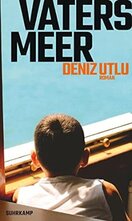
Father's sea (Vaters Meer)
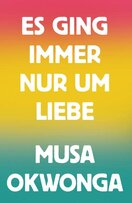
In the End, It Was All About Love (Es ging immer nur um Liebe)
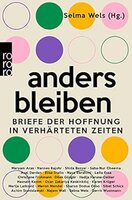
stay different (anders bleiben)
Where assimilation does not work, there is pain
Different forms of text are needed in order to overcome stereotypes imposed by others: in order to bring about "Das Ende der Unsichtbarkeit" ("The End of Invisibility"), which is the title of a non-fiction book by Hami Nguyen. In it, she describes the interwoven experience of anti-Asian racism and classism, drawing on her own experience and the history of Vietnamese migrants, which is often absent from histories of Germany. Similarly, the issue of social class is often absent from explanations of people’s complex biographical experiences. Marlen Hobrack, for example, debunks the middle-class myths of social mobility and equality of opportunity in "Klassenbeste" ("Top of the Class"), demonstrating that every identity politics debate has the issue of class at its heart. "Vatermal" ("Birth Mark") by Necati Öziri revolves around the experiences of narrator Arda and his friends, and how these experiences relate to immigration, class and illness. These ‘boys’ are seen as outsiders in Germany because they hang around train stations and are on the police’s radar. They have to cultivate their own self-image with which to counter the image others have of them. This theme is also addressed in "Hund, Wolf, Schakal" ("Dog, Jackal, Wolf"), by Behzad Karim Khani, in which eleven-year-old Saam, a refugee from Iran, feels doubly foreign in the majority-Arab neighbourhood of Neukölln as he tries to step into the role of head of the family. On the other hand there are the educational climbers, the people seen as ‘well integrated’, who are described by Betiel Berhe in her non-fiction book "Nie mehr leise – die neue migrantische Mittelschicht" ("Never Quiet Again – The New Migrant Middle Class").
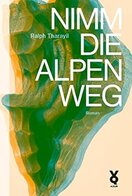
Take away the Alps (Nimm die Alpen weg)

The end of invisibility (Das Ende der Unsichtbarkeit)
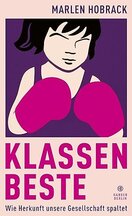
Top of the Class (Klassenbeste)

Birthmark (Vatermal)
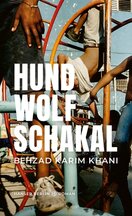
Hund Wolf Schakal (Dog Wolf Jackal)
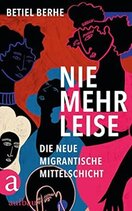
Never quiet again (Nie mehr leise)
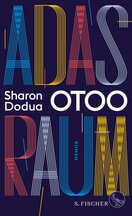
Adas Raum (Ada's Realm)

Disabled and proud (Behindert und stolz)

If You Want To Be Inclusive, You'll Find A Way. If You Don't, You'll Find An Excuse
What does inclusion mean – including in a literary sense? It is something fundamentally democratic, because it is a learning process, a sociopolitical principle according to which nobody is excluded and forced to adapt; instead everybody is included just as they are. And ‘we’ are a society of intersections, which explains why there are sometimes tensions between us, why there are hierarchies and ambivalent narratives. For this reason it is important that we accept the contradictions arising from our differences. And literature can help us to better understand these.
They live the beauty of difference
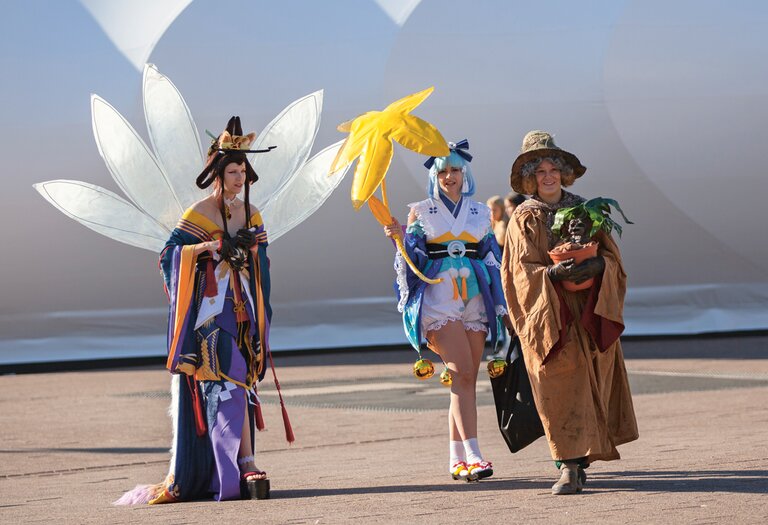
Learning together – learning togetherness
A ‘learning process of socialisation’ is what the educationalist Maisha-Maureen Auma calls concepts that look critically at societal power structures. And children’s books fall into this category, because they have an impact on children’s thinking, language and view of the world. We need only look at a bookshelf and ask ourselves who is represented there, or which children will feel themselves represented there. Is it only white children, able-bodied children, children living in heterosexual family units?
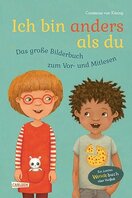
I am different from you - I am like you (Ich bin anders als du – Ich bin wie du)

The Sun, So Bright and Black (Die Sonne, so strahlend und schwarz)

What Are You Having? A Child! (Was wird es denn? Ein Kind!)
Children do not need books that are explicitly about racism or other experiences of difference in order to see norms being challenged. What matters is that differences are perceived as natural, which is why our plurality is now increasingly found in children’s books too. "Ich bin anders als du – Ich bin wie du" ("I Am Different From You – I Am Like You") by Constanze Kitzing is an example of how this can work even for very young children. And the young adult book "Die Sonne, so strahlend und Schwarz" ("The Sun, So Bright and Black") by Chantal-Fleur Sandjon helps readers discover multiple perspectives on life by exploring Nova’s complex identity and love life as a queer young Black woman in Germany, in rich poetic language. "Was wird es denn? Ein Kind!" ("What Are You Having? A Child!") is the title of Ravna Marin Siever’s non-fiction book about giving children a gender-neutral upbringing. Because the process of growing up is particularly full of ‘pluralities’ which adults, in their homogenous bubbles, often do not experience any longer. There are many opportunities to unlearn what we have learned. Including in children’s literature.
About the author
Hadija Haruna-Oelker is a journalist, radio news presenter and political scientist. Her journalism focuses on social issues, migration, racism and intersectional perspectives. She is co-translator of Amanda Gorman’s "The Hill We Climb". Her first memoir, "Die Schönheit der Differenz", was published in 2022.



